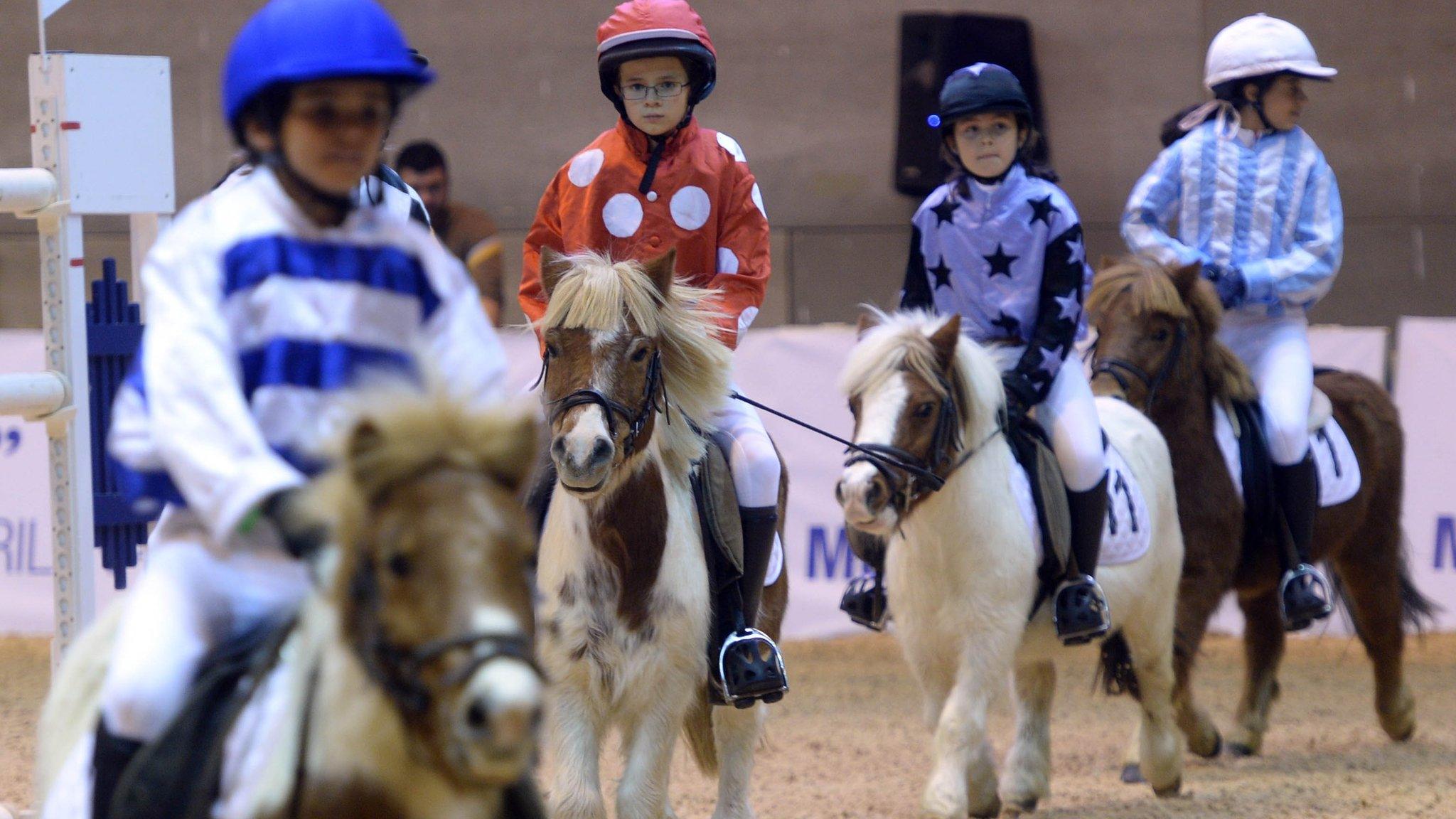Frankel's foals: Horses under the hammer in Newmarket
- Published
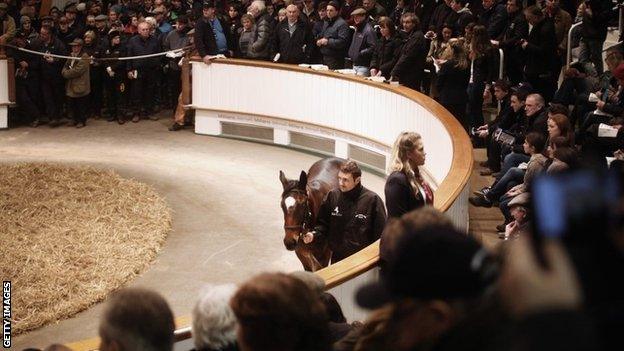
Lot Number 1103, one of 250 horses available at the Tattersalls bloodstock auction, walks around the sale ring with his stud hand
Death, taxes, Frankel - racing's wise guys cited three certainties when the wonder horse was routing his rivals on the track.
Now, there are fewer guarantees as the unbeaten colt strides out on a second career, as a £125,000-a-time super stud.
Plenty are still ready to gamble on the bloodline of a sporting great valued at £100m - more than any footballer - to take a costly chance on the stallion's sons and daughters being champions of the future.
On the day three Frankel foals were offered to wealthy bidders at the Tattersalls bloodstock auction in Newmarket, BBC Sport discovered what happens when horses go under the hammer.
Inside the sale ring
Around a circle of straw no bigger than a football penalty area parade some of the finest young horses in Europe.
From 0930 in the morning to 1930 at night, the relentless patter of the auctioneer rat-a-tat-tats to the assembled throng against a backdrop of clip clops and yays and neighs.
"At 85, 85, now. Yes madam. 90 thousand. 90 thousand. 100, 115, yes sir. We have 120. Last chance. All done, sold."
It's a call to bid as buyers and sellers gather around the sales ring.
This is day three of the December Foal sale, and while shoppers elsewhere sought discount deals on so-called Black Friday, buyers here are eyeing equine bargains.
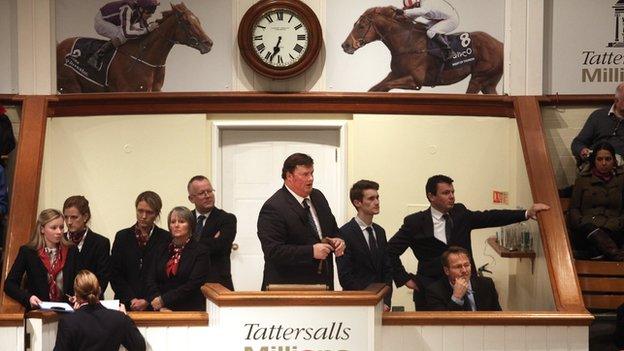
The auctioneer seeks bids as spotters point out potential buyers, sometimes secreted away in stairwells
Who's in the house?
Sellers, speculators, buyers, breeders, owners, trainers, riders…
To my left is a member of the Qatari royal family, to my right one of Ireland's greatest jockeys - Sheikh Fahad al Thani and Mick Kinane separately strolling around almost unnoticed.
Bloodstock banter |
|---|
Seven auctioneers alternate during the 10 hours of action - and they throw in a few choice phrases to stir up the market |
Building a buzz -"What a cracker"; "ticks all the boxes"; "doesn't he look the part?"; "bidding is half the fun" |
Words of wisdom - "Chance your arm"; "just one for luck"; "Are you brave enough?"; "You snooze you loose" |
John Ferguson waves his hand as a representative of Sheikh Mohammed, the ruler of Dubai, while the Coolmore Stud crowd coolly assess who might fit into their Irish empire.
The dress code is smart country casual. Puffed-up jackets, laidback jeans, the odd flat cap, and a few baseball caps bearing the names of top stallions.
Serious conversations are whispered in the wintry air outside the parade ring as darkness falls, floodlights burn brightly, and the all-important navy Tattersalls sales book are clutched tightly.
This is an encyclopaedia of thoroughbred titbits, running to hundreds of pages, listing family trees, birth dates and race records.
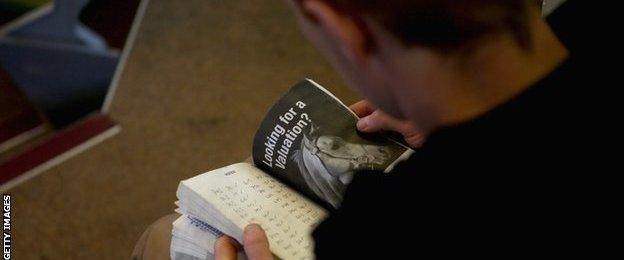
Studying the pedigrees is all-important at the bloodstock sales
What's the fuss about Frankel?
Fourteen wins from 14 races. Nine successive victories at the top Group One level. The highest-rated horse since modern ratings began. Frankel was a talking horse who did his talking on the racecourse.
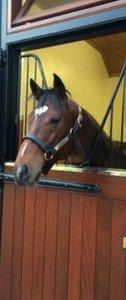
Frankel in his stable at Banstead Manor Stud
Observers on the gallops once claimed to see him outsprinting the Newmarket to Cambridge train service.
Frankel wasn't just first class, he was all class. His astonishing demolition of the 2,000 Guineas field on the nearby Rowley Mile racecourse an early shot in a series that derailed all his opponents.
Named after one famous trainer, American Bobby Frankel, and guided through his career by another, Sir Henry Cecil, the horse's tale had a Hollywood feel to it.
Cecil was champion trainer 10 times before his career hit the rocks amid an imploding personal life. He fought back, battling cancer and forming the formidable partnership with his beloved Frankel that provided the ultimate swansong before his death last year.
The horse has the pedigree, too, as a son of outstanding sire Galileo. Buying into the Frankel bloodline, is buying into the legend.
"He has a certain aura about him," said Philip Mitchell, general manager of Banstead Manor Stud, where Frankel now lives, on the outskirts of Newmarket.
"He knows he's the best, he knows he's important and the foals we've got on the stud are similar in character. They are beautifully behaved, very good tempered and they just walk like panthers."
Frankel facts | |
|---|---|
Winning margin: In 14 races, the aggregate distance between Frankel and runner-up was 76.25 lengths (610 feet or 185 metres). | Stride: His stride has been estimated at about 22ft, as opposed to 20 to 21ft for many other racehorses |
Speed: Average top speed of 43mph is almost twice that of Usain Bolt. | Betting: Odds-on in all races, except first - £1 on his 14 wins would have made a profit of just £5.96. |
But why no takers?
Never mind Black Friday, breeding followers had billed it Frankel Friday.
However, of four Frankel foals listed for sale, one was withdrawn and the other three failed to reach their reserve price.
While the potential is obvious, the stallion has yet to pass the ultimate test - that of seeing his offspring succeed on the racetrack.
"You'd love to sell every single horse but that is never going to happen," said Jimmy George, marketing director for Tattersalls.
The bidding for one colt, a son of Swiss Lake, was at 350,000 guineas when it was bought back by the seller.
"These guys have some beautiful animals but they cost a lot to produce and if their valuation isn't met, they are happy to keep them to race, or maybe bring them back to the sales in the future," said George.
Learning the lingo | |
|---|---|
Guineas - Sales at Tattersalls are conducted in guineas. A guinea was one pound and one shilling (£1.05 in decimal currency). So a horse that sells for 20,000 guineas will actually cost £21,000, with the auction house usually taking the five per cent as commission. | Stamp - Breeders talk of stallions stamping their stock - cast in their own image. Some Frankel progeny might have a white star on their head, and white socks, just like their father. |
Progeny - The stallion's offspring. The sons and daughters | By/Out of - If a foal is by Frankel, out of Didarna. It means Frankel is the father (sire) and Didarna is the dam (mother) |
The reserve prices are a secret between the seller and the auctioneer, but an opening invitation - not taken up - to get the ball rolling at 400,000 gives some indication.
One of the foals was later snapped up by Irish buyer Dermot Farrington for 150,000 guineas in a private sale. He had paid nearly 10 times that for another Frankel filly only nine days earlier.
About 80% of the 240 foals offered did sell - at an average of £85,000 each, for a combined total of more than £16m. Enough to buy a decent little Newmarket street.
What next?
Frankel has already mated with more than 200 mares, and there are more waiting when he resumes his breeding career around Valentine's Day in February 2015.
The next time his name will be announced in the Tattersalls sale ring is likely to be in October for the fabled Book One sale, where the leading yearlings are on show, and Sheikh Mohammed might make an appearance in person.
Frankel foal sells for Irish record of £1.45m at Goffs
Then the moment of truth comes in the summer of 2016 when Frankel's name appears in racecards again, as the sire of his first horses to race.
As with houses, stud fees can go up as well as down, though no-one is expecting a crash.
"We set the bar quite high at £125,000 because this was possibly the best racehorse we've seen," said Mitchell.
"If his foals go on to be as half as good as he is, I don't think the fee would be coming down."
Tattersalls welcomed TV crews and had widespread media coverage ahead of Friday's sale. Frankel's legacy lives on.
"I don't think we understood ourselves just how attached the general public was to this horse," said Mitchell.
"Big grown men touch the horse and almost break into tears - I've touched Frankel, they say. He is so, so popular and has taken the breeding industry to a different level and hopefully it can help the younger generation get involved."
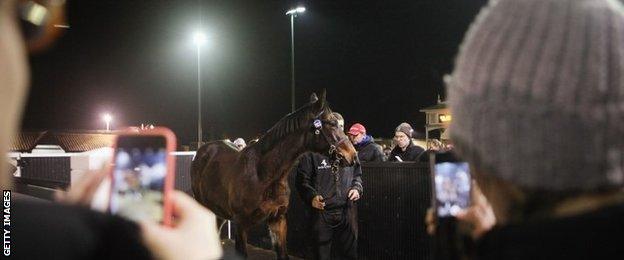
Frankel fans take snaps of a foal under the floodlights
- Published20 November 2014
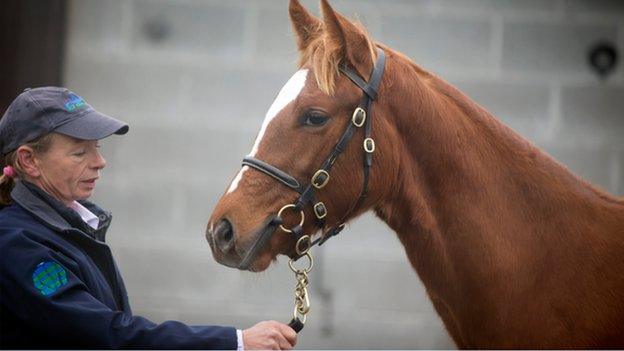
- Published18 October 2013
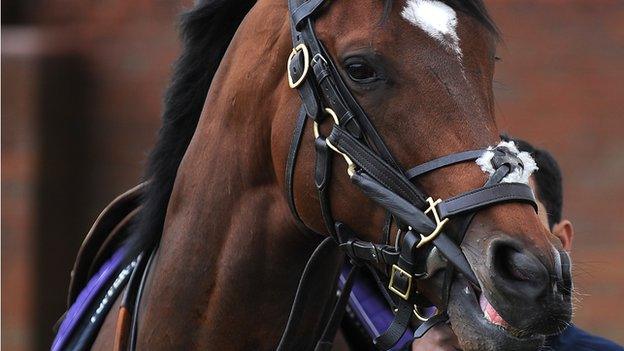
- Published22 October 2012
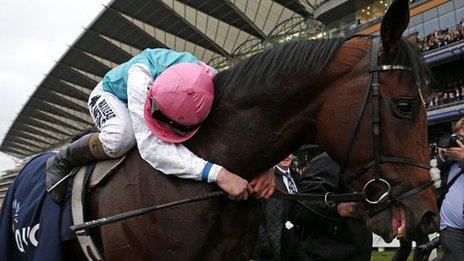
- Published16 June 2014
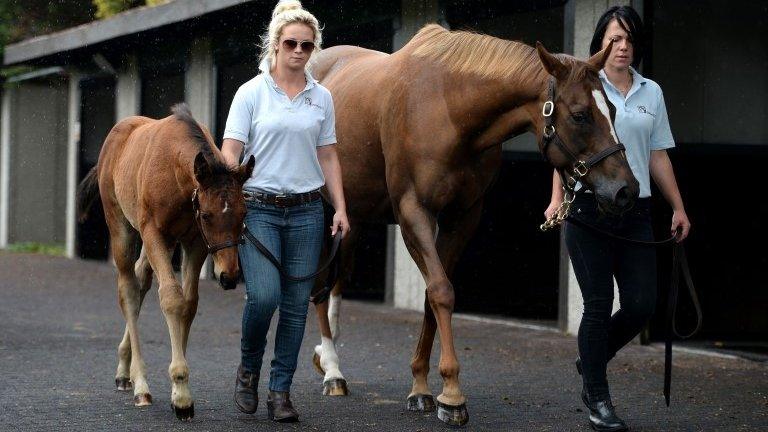
- Published21 December 2018
